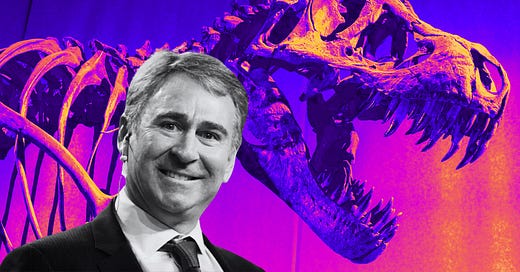Did AI Fly Too High Too Fast, The Tech Stock Plunge And Rich Guy Buys A Dinosaur
Billionaire Buying A Dinosaur
Billionaire investor Ken Griffin paid $44.6 million for a nearly complete Stegosaurus skeleton nicknamed "Apex" at a Sotheby's auction, shattering previous fossil auction records. This purchase far exceeded the initial estimates of around $6 million and surpassed the previous record of $32 million paid for a Tyrannosaurus rex skeleton named "Stan" in 2020.
Griffin's motivation for this extraordinary purchase appears to be a combination of personal interest in paleontology and a commitment to preserving important scientific specimens in the U.S. He stated, "Apex was born in America and is going to stay in America!" Griffin plans to potentially lend the specimen to an American institution, continuing his history of supporting scientific and cultural institutions.
This isn't Griffin's first foray into paleontology-related philanthropy. In 2018, he donated $16.5 million to Chicago's Field Museum to support the exhibition of a replica of the largest dinosaur ever discovered. His interest in dinosaurs and fossils seems to be a recurring theme in his philanthropic efforts.
Griffin also made a record-breaking purchase of a $238 million New York City penthouse in 2019 and a $107 million luxury waterfront compound in Miami-Dade County.
Goldman Sachs Questions The Bull Run In AI
Goldman Sachs has expressed some skepticism about the current artificial intelligence boom, but their overall stance is nuanced rather than predicting an imminent bust. The firm is raising important questions about the return on investment for AI technologies and whether the massive expenditures in this field will ultimately pay off.
Goldman has highlighted that the AI industry needs to generate approximately $600 billion annually just to break even on its initial investments. This has led them to question whether these investments will be economically viable in the long run. The firm's experts are divided on this issue, with some expressing skepticism about AI's ability to solve complex problems more efficiently than existing technologies, while others remain optimistic about its potential.
Despite these concerns, the investment bank does not definitively predict an AI bust. Instead, they acknowledge that the AI investment cycle is still in its early stages, primarily focused on infrastructure development.
They compare it to previous technological cycles, suggesting that it may take time for the full benefits to materialize. The firm also notes that unlike previous tech booms, established companies are leading the AI revolution, which could reduce the risk of the technology failing to become mainstream.
Goldman Sachs recognizes significant challenges facing AI development, particularly in terms of chip availability and power consumption. While they are raising important questions about the economic viability of AI investments, they are not definitively predicting an imminent bust, but rather encouraging a more measured and critical examination of the technology's potential and challenges.
Tech Stocks Are Getting Slammed
The tech sector experienced a significant sell-off early this week, with the Nasdaq Composite falling 2.7% on Wednesday, marking its worst single-day decline since December 2022. This downturn was primarily driven by concerns over potential tightening of semiconductor export restrictions to China and geopolitical tensions surrounding Taiwan.
The sell-off in tech stocks is part of a broader market rotation, where investors are shifting away from the high-flying tech names that have led the market rally over the past year. This rotation is seeing money flow into other cyclical areas of the market that haven't participated as much in the S&P 500's recent surge.
It's important for investors to understand that this shift doesn't necessarily signal the end of the bull market, but rather a rebalancing that could potentially strengthen the foundation for a more sustainable rally.
Despite the tech sector's decline, the overall earnings picture for S&P 500 companies remains positive. Early reports show sales growth up 5.4% and earnings growth of 16.7% year over year, both exceeding Wall Street expectations. This suggests that the broader market fundamentals remain strong, even as tech stocks face headwinds.
Investors should be aware that while tech stocks are experiencing volatility, other sectors are showing resilience. Seven out of 11 sectors in the S&P 500 were still in positive territory despite the overall index decline. This highlights the importance of diversification in investment portfolios.
As for which stocks investors should consider, there's no one-size-fits-all answer. However, the current market conditions suggest that looking beyond the tech sector could be beneficial. Small-cap stocks, represented by the Russell 2000 index, have been outperforming large-cap tech stocks in recent sessions.
Additionally, companies that could benefit from U.S. government initiatives to onshore semiconductor manufacturing, such as Intel and GlobalFoundries, saw gains even as other chip stocks declined.
Ultimately, investors should focus on maintaining a diversified portfolio that aligns with their risk tolerance and long-term financial goals. While the tech sector has been a strong performer, the current market dynamics underscore the importance of not over concentrating in any single sector or group of stocks.
Thriving In Chaos: How To Be Super Successful, Wealthy And Happy In A F*cked-Up World
We all have something in common: there’s an innate human desire to succeed in life—socially and at work. We want to be loved, forge lasting, fulfilling relationships, enjoy career and financial success and lead wonderful, productive lives.
This seems reasonably simple enough. However, it’s getting exceedingly difficult to stand out in a crowded workplace to get noticed and appreciated for your hard work and efforts, especially in a doom-and-gloom, tough economic environment with high inflation and costs continually rising.
Success in life and work is about developing a holistic approach that nurtures various aspects of personal and professional growth. Despite the odds, you must cultivate a combination of factors that include possessing a positive mindset and attitude, grit, a strong work ethic, a sense of purpose and fostering constructive habits to reach your goals and ambitions.
The goal of this book is to offer the tools, advice and guidance to succeed in your life and work.





